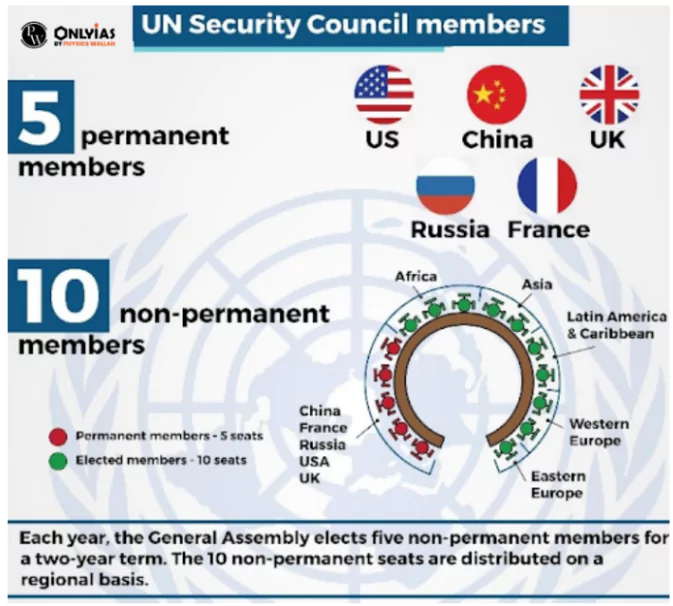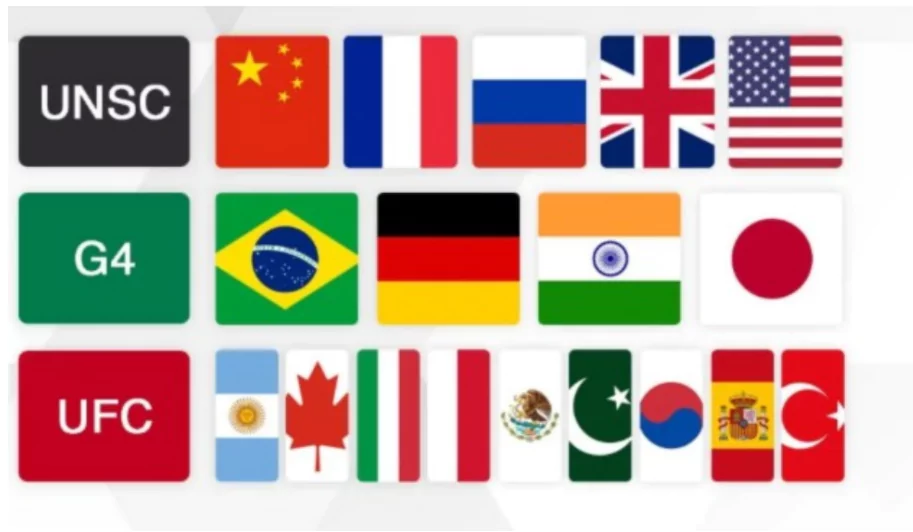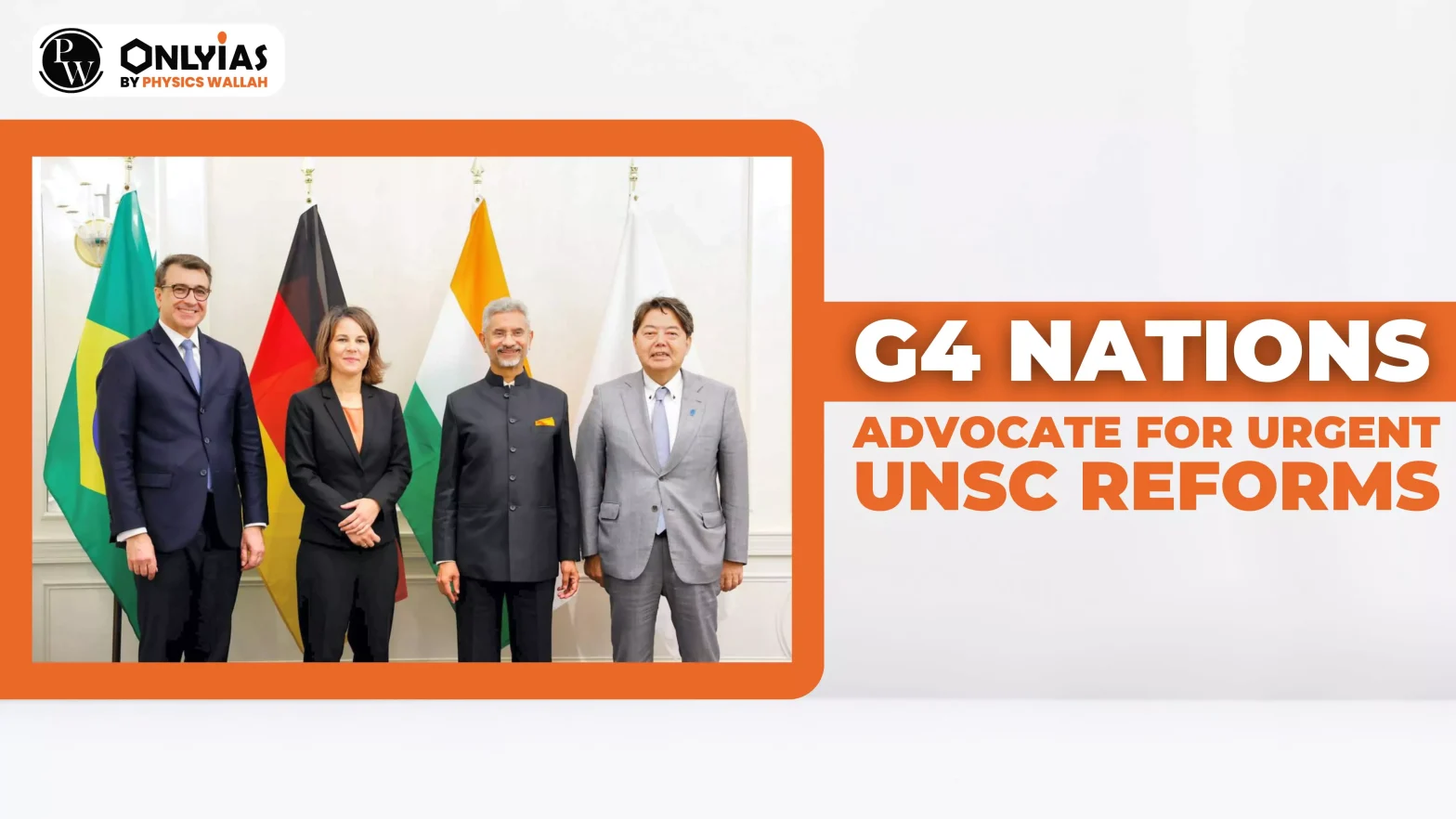Recently, The G4 nations, represented by India, Brazil, Germany, and Japan, have called for urgent reforms to the United Nations Security Council (UNSC).
- They highlighted the issue of lack of representation and the “ill-equipped” UNSC to handle modern global challenges.
About the United Nations Security Council
The United Nations Security Council, established under the UN Charter in 1945, constitutes one of the UN’s six principal organs.

- First Session: It held its first session on 17th January 1946 in Westminster, London.
- Headquarters: New York City
- Mandate: It has primary responsibility, under the UN Charter, for the maintenance of international peace and security.
- Members: Comprising 15 members, it includes 5 permanent members (P5) and 10 non-permanent members elected for two-year terms.
- Permanent members: They are the United States, Russian Federation, France, China, and the United Kingdom.
- 10 non-permanent Members: Seats are distributed on a regional basis:
- Five for African and Asian States
- One for Eastern European States
- Two for the Latin American and Caribbean States
- Two for Western European and other States
Enroll now for UPSC Online Course
Election of Non-Permanent Members
- Each year the Members of UNGA elects five non-permanent members for a two-year term at the UNSC, with five replaced each year.
- To be approved, a candidate must receive at least two-thirds of all votes cast for that seat, which can result in deadlock if there are two roughly evenly matched candidates.
- A retiring member is not eligible for immediate re-election.
|
- Decision Making: Decisions of the Security Council are binding
- Majority: It must only be passed by a majority of nine out of the 15 members, as well as each of the five permanent members.
- “Veto power”: It refers to the power of the permanent member to veto (Reject) any resolution of the Security Council.
- Criticism: The unconditional veto possessed by the five governments has been seen as the most undemocratic character of the UN.
- Critics also claim that veto power is the main cause for international inaction on war crimes and crimes against humanity.
- Supporters of the Veto Power: They regard it as a promoter of international stability, a check against military interventions, and a critical safeguard against U.S. domination.
- Chapter VI of the UN Charter: When the Security Council considers a threat to international peace, it first explores ways to settle the dispute peacefully under Chapter VI
- Chapter VII of the Charter: Council can also take measures to enforce its decisions.
- It can impose economic sanctions or order an arms embargo.
- On rare occasions, the Security Council has authorized member states to use all necessary means, including collective military action, to see that its decisions are carried out.
Need for UNSC Reforms
There are various voices raised across the World to make changes in UNSC.
- Reforms Long Overdue: It was expanded only once in 1963 to add 4 non-permanent members.
- Although the overall membership of the UN has increased from 113 to 193 no change in the composition of the UNSC happened.
- Percentage Decreases: The UN was founded in 1945 and consisted of 11 members out of a total UN membership of 51 countries, i.e. some 22% of the member states,
- While today, there are 193 member-states of the UN, and only 15 members of the Council i.e., fewer than 8%.
- Failure to Address Contemporary Issues: Its failure to intervene effectively in civil wars and internal conflicts, where the sovereignty of nations is a major consideration.
- For Example: In cases like Israel-Palestine Conflict, Russia-Ukraine Conflict, Yemen, Syria, and Myanmar, the UNSC has been unable to stop the violence or deliver meaningful humanitarian aid due to political divisions among its members.
- Wider and Inclusive Representation: The UN represents a larger world, however it has only 5 permanent members in its permanent membership.
- The regions like far East Asia, South America, and Africa have no representation in the permanent membership of the UNSC.
- Many countries, both in absolute numbers and as a proportion of the membership, do not feel adequately represented on the body, highlighting the need for UNSC reforms.
- Contemporary Realities: The current composition of the UNSC represents the post-World War II realities and hence is not in pace with the changing balance of power in the world.
- Veto Power by Permanent Members: The five permanent members (China, France, Russia, the United Kingdom, and the United States) enjoy the privilege of a veto over any Council resolution or decision.
- Unjust representation and Equity:
- Undue Weightage: The composition of the Council gives undue weightage to the balance of power of those days.
- For example, Europe accounts for barely 5% of the world’s population, and still controls 33% of the seats in any given year (excluding Russia).
- Unjust in Equity: Japan and Germany have for decades been the second and third largest contributors to the UN budget, while still being referred to as ‘enemy states’ in the United Nations Charter (since the UN was set up by the victorious Allies of the Second World War).
- Denial of Opportunity: It denies opportunities to other states such as India, which is highly populous, have a great share in the world economy, or contributions in kind to the UN (like participation in peacekeeping operations) have helped shape the evolution of world affairs, highlighting the need for UNSC reforms.
Check Out UPSC CSE Books From PW Store
G4 Countries v/s Coffee Club
- Uniting for Consensus (UFC) is a movement, nicknamed the Coffee Club.
 The Uniting for Consensus (UfC), emerged in the 1990s as a movement opposing the expansion of permanent seats in the United Nations Security Council. The Uniting for Consensus (UfC), emerged in the 1990s as a movement opposing the expansion of permanent seats in the United Nations Security Council.- It counters the bids for permanent seats proposed by G4 Countries.
- Members: Most members are middle-sized states who opposed bigger regional powers grabbing permanent seats in the UN Security Council.
- The prime movers of the club include Italy, Spain, Australia, Canada, South Korea, Argentina and Pakistan.
- Regional Rivalry: It consists of nations that are selectively opposed to the G4 Countries due to regional rivalry such as Pakistan against India, Italy against Germany, Argentina and Mexico against Brazil, etc.
|
Impediments that the country has faced in this pursuit
- Veto Power of Existing Permanent Members: One of the main obstacles to India’s bid for a permanent seat is the veto power held by the current permanent members of the UNSC – the United States, Russia, China, France, and the United Kingdom.
- These members are unlikely to approve an expansion of the permanent seats as it would dilute their own power and influence.
- Opposition from Other Countries: There are other countries that also aspire for a permanent seat in the UNSC, including Brazil, Germany, and Japan, and they may oppose India’s bid.
- The opposition could be due to various reasons, Like regional politics or competition for resources.
- Lack of Consensus Among Existing Members: There is no consensus among the existing members of the UNSC on the issue of expanding the permanent seats.
- Some members may be open to the idea, while others may be opposed. Without a consensus, India’s bid is unlikely to succeed.
- Historical Issues: India’s history of non-alignment during the Cold War and its nuclear tests in 1998 have created a negative perception among some countries. These historical issues could be used as a basis for opposing India’s bid for a permanent seat.
- Current Issues: India’s human rights record, its Kashmir policy, and its border disputes with neighboring countries such as China and Pakistan have also been used to question its suitability for a permanent seat.
- These issues could be used by countries opposed to India’s bid to argue against it.
- Financial contributions: Some members may argue that India has not made enough financial contributions to the UN, which is a criterion for being considered for a permanent seat.
UNSC Reform Agenda
- The current negotiation process is based on Decision 62/557 which was adopted in 2008.
- It defines five key issues for reform:
- Categories of membership
- The question of the veto
- Regional representation
- The size of an enlarged Security Council and its working methods
- The relationship between the Security Council and the General Assembly.
- Decision 62/557: It also stipulates that any solution must garner “the widest possible political acceptance”, although in 1998 the UN General Assembly already agreed that the support of two-thirds of UN member states is sufficient.
- Consensus vs Majority: Yet even if these conditions are met any of the P5 will still be able to veto the final resolution.
- For example, China and Russia have previously stated that reform should be based on a consensus and not on a majority vote.
Check Out UPSC NCERT Textbooks From PW Store
G4 Suggested Roadmap
Following are the demands for UNSC Reforms put forward by G4 Nations:
- Increase in Representation: The group’s model of UNSC reforms has clearly proposed that the Security Council membership increase from the current 15 to 25-26 by adding six permanent and four or five non-permanent members.
- Among the six new permanent members, two each are proposed to be from African States and Asia Pacific states, one from Latin American and Caribbean states, and one from West European and Other States.
- Focus on Africa: On rights and privileges associated with permanent memberships, such as the veto, the group the Common African Position that as long as it exists, it should be available to all permanent members, both new and old alike.
- The G4 is convinced that African representation in permanent and non-permanent categories will be an indispensable part of UNSC reform for a more representative and effective Council.
- Potential of Africa: Africa is a continent with the youngest demography, vast natural resources, expanding capabilities, growing markets, and rising ambitions.
- Historical Injustice: G4 asserted that representation in key multilateral bodies is still not a reality for Africa and many other regions of the world & It is imminent for us to correct this historical injustice.
- The G20 inducted the African Union as a full member during the New Delhi Summit held in September last year under India’s presidency of the grouping.
- As Africa constitutes over 70% of the UNSC’s agenda items under discussion, it should have a permanent voice.
- Future Action: With world leaders convening in New York later next month for the annual high-level U.N. General Assembly session, they will also participate in the ambitious Summit of the Future convened by U.N. Secretary-General.
- The summit will produce an inter-governmentally negotiated, action-oriented ‘Pact for the Future’ with chapters on sustainable development and financing for development, international peace and security, among other things.
About Group of Four (G4) Nations
- The G4 nations traditionally meet on the sidelines of the annual high-level UN General Assembly session.
- Represents: It represents a group of Brazil, Germany, India and Japan that are aspiring to become permanent members of the UNSC.
- Aim: It was formed in 2005 to support each other’s bids for permanent membership of the UNSC.
|
Way Forward
- Text Based Negotiation: Consensus is an output of negotiations. It is important that we do not keep delaying reforms, waiting for a consensus to emerge as consensus can only be arrived at through text-based negotiations
- Restructured UNSC: India’s claim for permanent membership is a genuine demand in the changed geo politics of 21st century. India is possibly the most obvious and least controversial option to add as a permanent member, and probably long overdue for a seat.
- Unilateral Functioning must be avoided: UNSC under constant criticism for its plans and actions leading to the failure to keep international peace and security
- It is said to be performing in a unilateral way with unquestioned authority, working only for vested interests and not making non-permanent members inclusive in their decision making.
Enroll now for UPSC Online Classes
Conclusion
The Security Council is the only global system that brings all countries together on a common platform, hence reformist steps should be taken as soon as possible to maintain and expand its effectiveness and relevance.
![]() 19 Aug 2024
19 Aug 2024

